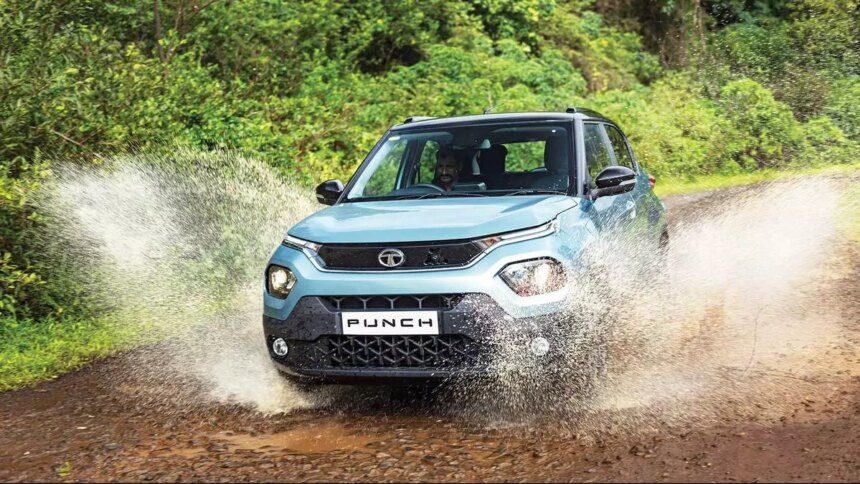Cuttack-based Abhishek Majumdar was in the market for a mid-sized car a few years ago. He test-drove four cars – Maruti Suzuki Baleno, Tata Nexon, Tata Altroz, and Tata Punch. Despite the Nexon’s powerful turbocharged engine, he opted for the Punch due to its affordability, spaciousness, global NCAP 5-star rating, and impressive mileage. Having driven over 11,000 km in his Punch to places like Burdwan and Chennai, Majumdar appreciates the car’s features such as the efficient AC and sound system, responsive steering, and well-organized controls. He describes it as a comfortable city car that performs well on the highway at speeds under 100 kmph.
Numerous new car buyers, like Majumdar, have shown a preference for Tata Motors’ compact SUV, the Punch, making it the best-selling utility vehicle and surpassing Maruti’s popular models like the Wagon R, Brezza, and Ertiga. Since its launch in October 2021, Tata Punch sales have exceeded half a million units, including 2.02 lakh units in 2024. This success has positioned Tata ahead of Maruti Wagon R, Maruti Ertiga, Maruti Brezza, and Hyundai Creta in terms of sales figures. The once-chart-topping Maruti Swift now trails in sixth place with 1.73 lakh units sold in CY24.
The rise in SUV sales post-Covid, especially in the compact segment, has been fueled by the introduction of new models, while small car sales have been impacted by pricing increases and economic challenges. The current fiscal year saw UV sales totaling 22.6 lakh units in the first 10 months, compared to 20.2 lakh units in the previous year. In contrast, passenger car sales declined from 12.8 lakh units to 11.03 lakh units.
Maruti Suzuki continues to lead the UV segment with a 25% market share in the first nine months of FY25, followed by Mahindra & Mahindra, Tata Motors, and Hyundai. Maruti’s expanded SUV lineup, which includes popular models like the Fronx and Jimny, has contributed to its segment share growth from 11% in FY21-22 to the current 25%.
As automakers vie to capitalize on the growing SUV trend, Tata Motors has emerged as a key player in the compact SUV category, driven by the success of models like Nexon and Punch. The Tata Punch, available in petrol, electric, and iCNG variants, caters to a diverse range of consumers. The electric variant, Punch.ev, has also garnered attention for its premium features and top-notch safety features, clinching a GNCAP 5-star rating with the highest adult occupant protection score.
Industry experts like Puneet Gupta from S&P Global Mobility attribute Tata Punch’s success to its diverse powertrain options and strong value proposition in terms of design, performance, and features. However, he notes that Maruti Suzuki still retains an advantage in the smaller car segments, given India’s significant growth potential in car ownership rates.
In the highly competitive SUV market, Tata Motors leads in UV sales, with Mahindra securing the second position with a range of feature-rich SUVs. The battle for the third spot remains close between Tata and Hyundai, emphasizing the intensity of competition in the SUV segment.
Looking ahead, Maruti Suzuki faces challenges in gaining a substantial market share in specific UV sub-segments, although it is likely to dominate in other segments through existing models and new launches. The company’s plan to introduce six new SUV models over the next 3-4 years reflects its commitment to staying competitive in the evolving market.
The shift towards electric mobility is also reshaping the automotive landscape, with leading players introducing electric SUVs to cater to changing consumer preferences. Maruti’s e-Vitara promises a range of over 500 km and is expected to launch later this year, signaling the company’s focus on sustainable EV models and market dominance.
In the electric PV market, Tata Motors leads the way, followed by MG Motor with its electric SUV MG Windsor and Mahindra & Mahindra with strong bookings for their electric SUVs. The growing interest in electric vehicles is expected to drive innovation and expand the segment’s appeal to a broader consumer base.
Maruti Suzuki’s expertise in cost-efficiency and large-scale operations positions it well to make EVs commercially viable and competitive. The company’s multi-fuel technology strategy aligns with emission reduction goals while maintaining its presence in the alternative fuel segment.
With its extensive distribution network, diverse product portfolio, and competitive advantages, Maruti Suzuki is poised to present formidable challenges to emerging competitors in the SUV segment. As the market continues to evolve, automakers are focusing on innovative designs, advanced technology, and leveraging their strengths to gain a competitive edge.
Overall, the automotive industry is experiencing a pivotal moment with the rise of SUVs, electric vehicles, and advanced technologies. Companies like Tata Motors and Maruti Suzuki are adapting to these changes, aiming to meet consumer demands and stay ahead in the competitive market landscape.










